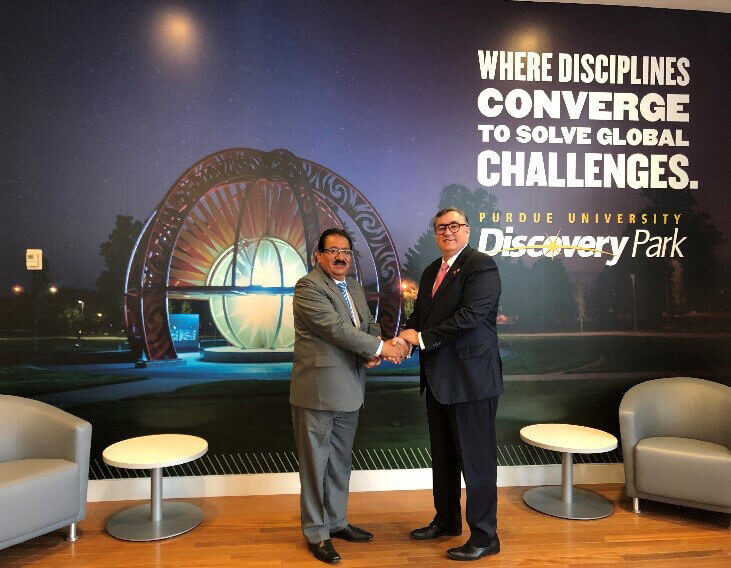July 1, 2019
Discovery Park and Peru’s UNCP form strategic alliance
 Moises Ronald Vasquez Caicedo Ayras, president of UNCP, and Tomás Díaz de la Rubia, vice president for Discovery Park. (Photo provided)
Download image
Moises Ronald Vasquez Caicedo Ayras, president of UNCP, and Tomás Díaz de la Rubia, vice president for Discovery Park. (Photo provided)
Download image
Discovery Park is announcing the development of a Strategic Alliance Agreement between Purdue and Universidad Nacional del Centro del Peru (UNCP). This agreement will explore technical assistance, education, workforce development and professional services to further the mission of UNCP.
The UNCP alliance is the latest example of Purdue’s growing international impact with programs already in place in Africa, Colombia, India, China and Ireland. The goal of the partnership is to help UNCP develop state-of-the-art environmental sustainability programs that will help local communities.
“The strategic alliance between Purdue University and the National University of the Center of Peru creates Discovery Park – Junin and signifies the beginning of the scientific, technological and innovation development of our university and therefore of the Junin region,” says Moises Ronald Vasquez Caicedo Ayras, president of UNCP. “This alliance will allow the scientists and academics of this prestigious university to work with our scientists to develop research projects, entrepreneurship and innovation to solve the problems of ecosystem health, human health and economic development.”
This partnership will help fulfill UNCP’s aspirations to grow as a research university by providing student and faculty exchange programs, education and workforce development, technical and professional services, consulting, and fundamental and applied collaborative technical assistance.
Peru has the second most biodiverse ecosystem on the planet. The region of Junin is the breadbasket of Peru with products spanning from maize and quinoa in the valley to tropical fruits, coffee and cocoa in the Amazon jungle regions. However, outdated public health and land management practices threaten the long-term livelihood of the people of the region.
“We are confident this alliance will create a new era of knowledge, discovery and innovation for UNCP that will help preserve this fragile ecosystem, and will develop new technologies that assist the local communities with adoption of state-of-the-art practices,” says Tomás Díaz de la Rubia, vice president for Discovery Park.
Modeled after Purdue’s Discovery Park, a transdisciplinary research, innovation and commercialization ecosystem, the new UNCP technology park will be named Discovery Park – Junin. Discovery Park – Junin will be launched with its flagship Institute for Human and Ecosystem Health Sustainability (IHEHS). IHEHS will be led by Tim Filley (co-principal investigator), professor of atmospheric, earth and planetary sciences and agronomy and director of the Center for the Environment; Jessica E. Huber (co-PI), associate dean for research in the College of Health and Human Sciences; and Jennifer Freeman (co-PI), associate professor of health sciences.
Discovery Park – Junin will be designed to serve as the reference point for research on environmental health, food safety, drug discovery and human health across the life span with an emphasis on entrepreneurship and sustainability. The core centers within IHEHS will manage and house essential analytical environmental, food safety, and drug discovery laboratories; centers for the development and testing of new treatments (behavioral and drug-based) to improve human health; and support for a burgeoning entrepreneurship program.
The first research project for IHEHS, led by Ramaswamy Subramanian, professor of biology and biomedical engineering and director of the Bindley Bioscience Center, is setting up a Center for Biodiversity, Chemical and Synthetic Biology. The long-term goal of this project is to understand the explored and unexplored biodiversity in the Junin province, and convert that knowledge into technologies for sustainable development. The interest in medicinal plants has never been stronger, but obtaining these plants through either cultivation or gathering has detrimental effects on the region. The new center will study biodiversity, chemical biology and synthetic value.
Purdue became involved with UNCP after signing an agreement with the Core Foundation in 2016 agreeing to explore opportunities to provide solutions and economic innovations to help developing communities, especially those in Latin America. Core Foundation represents 19 universities in Peru with the mission to promote economic development through strategic partnerships between universities, government and private companies in North and South America.
“Core Foundation is an organization that helps reach 15 of the 17 global goals made by the United Nations for sustainable development,” says Ricardo Torreblanca, Core Foundation president and CEO. “The impact of Core Foundation has been bigger than I have ever imagined, and I can see that we are on the right track.”
About Discovery Park
Discovery Park is a place where Purdue researchers move beyond traditional boundaries, collaborating across disciplines and with policymakers and business leaders to create solutions for a better world. Grand challenges of global health, global conflict and security, and those that lie at the nexus of sustainable energy, world food supply, water and the environment are the focus of researchers in Discovery Park. The translation of discovery to impact is integrated into the fabric of Discovery Park through entrepreneurship programs and partnerships.
About Universidad National Del Centro Del Peru
Universidad National del Centro del Peru (UNCP) is the largest public university of the center of Peru. It was founded by supreme decree law No. 46 on Dec. 16, 1959. Apart from its main campus in El Tambo, Huancayo, the university runs decentralized establishments in Junín, Satipo, and Tarma. The first rector was distinguished Peruvian geographer Javier Pulgar Vidal. UNCP contributes to integral development of the central region, positioning itself as one of the main universities of the country with a postgraduate school with 20 master’s degree and six doctorate programs.

